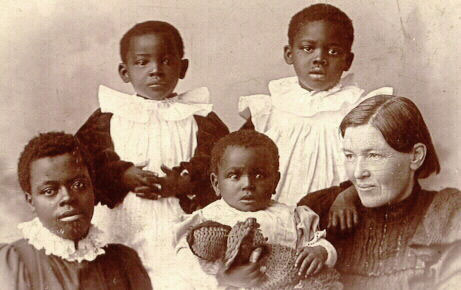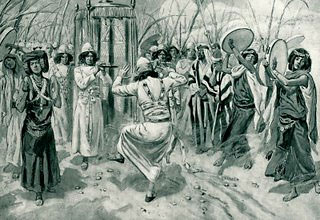Apr
10
2009
Evil Empire?
More and more today we hear that America has an empire, is an imperialistic nation, and therefore is increasingly evil. In my line of work I hear this all the time from liberal and neo-evangelical theologians. Empires are by definition evil. This is often linked up with the notion that violence is always evil…
Continue reading
Comments Off | tags: James Jordan, Politics | posted in Quotes
Apr
10
2009
Dear Heathen:
The Lord Jesus Christ hath promised that the time shall come when all the ends of the earth shall be His kingdom. And God is not a man that He should lie nor the son of man that He should repent. And if this was promised by a Being who cannot lie, why do you not help it to come sooner by reading the Bible, and attending to the words of your teachers, and loving God, and, renouncing your idols, take Christianity into your temples? And soon there will not be a Nation, no, not a space of ground as large as a footstep, that will want a missionary. My sister and myself have, by small self-denials, procured two dollars which are enclosed in this letter to buy tracts and Bibles to teach you.
Archibald Alexander Hodge, and Mary Eliz. Hodge,
Friends of the Heathen.
(June 23, 1833. A letter to the “heathen” from ten-year-old A.A. Hodge and his sister Mary Elizabeth, given to J.R. Eckard, a Princeton Seminary graduate who was to go to Ceylon. Quoted in Princeton Seminary: Faith and learning 1812-1868,v. 1, p. 193).
From www.christkirk.com
Comments Off | tags: Mission, Postmillennialism | posted in Christian Life, Quotes
Apr
10
2009

As a mill girl, she never felt quite at ease with the social niceties and ample lifestyle of the several missionary families comfortably stationed at Duke Town. (And no doubt they had reservations about her—a twenty-nine-year-old woman who admittedly had climbed every tree worth climbing between Duke Town and Old Town.)
“Sending a single woman to the Okoyongs was considered by many to be an exercise in insanity, but Mary was determined to go and would not be dissuaded. After visiting the area a number of times with other missionaries, Mary was convinced that pioneer work was best accomplished by women, who, she believed, were less threatening to unreached tribes than men. So in August of 1888, with the assistance of her friend, King Eyo, of Old Town, she was on her way north.
For the next quarter of a century and more, Mary would continue to pioneer missions in areas in which no white man had been able to survive.
For fifteen years (minus two furloughs) she stayed with the Okoyongs, teaching them and nursing them and arbitrating their disputes. Her reputation as a peacemaker spread to outlying districts, and soon she was acting as a judge for the whole region. In 1892 she became the first vice-consul to Okoyong, a government position she held for many years. In that capacity she acted as a judge and presided over court cases involving disputes over land, debts, family matters, and the like. Her methods were unconventional by British standards (often refusing to act solely on the evidence before her if she personally was aware of other factors), but they were well suited to African society.
Although Mary was highly respected as a judge and had influenced the gradual decline in witchcraft and superstition, she saw little progress in bringing Christianity to the Okoyongs. She considered herself a pioneer and she viewed her work as preparatory and was not unduly anxious that she could not send glowing reports back home of hosts of converts and thriving churches. She organised schools, taught practical skills, and established trade routes, all in preparation for missionaries (ordained men being her preference) to follow.”
Read the full article in PDF here.
Comments Off | tags: Biography, Church History, Mission | posted in Christian Life
Apr
10
2009

The church can learn a lot from gangs. Really. Men join gangs for one reason: they want a father figure.
Many troubled men grew up without strong male role models. But these men do not turn to church because the congregations they’ve attended are predominantly female, and the spirit of the place feels so warm, nurturing and gentle. Men need a masculine path to Christ. Young men crave a wilder, more demanding faith, and don’t mind the spur of discipline when it’s administered in love.
What if our churches were structured differently? What if the basic unit of the church were not the committee, but the band of brothers? What if every congregation had men leading other men to maturity in Christ? What if these spiritual fathers were challenging young men, and sending them out on dangerous missions (as a gang leader might send out a young initiate)?
Today, a young single man 18-35 is the person least likely to show up in church. Do you think a church based on spiritual fathering might turn that around?
David Murrow
www.churchformen.com
Comments Off | tags: David Murrow, Fatherhood, Masculinity, Mission | posted in Christian Life, Ethics
Apr
10
2009

“While he languished in prison, Joseph had no idea what was going on in Pharaoh’s heart. He did not realise that God the Holy Spirit was at work making Pharaoh dissatisfied. He did not know that one night God would bring His Word to Pharaoh and Pharaoh would need someone to interpret it. He did not know that one day his suffering would be rewarded, and he would stand before the king of the earth.
This should encourage us. We pray for our rulers and those in authority over us, but we don’t see them change. We have no way of knowing, however, what God may be doing. Our God is still the “God of Nightmares”! In our secular humanist society, Christians are often “in prison” in various ways. Yet God’s Word is faithful, and the time will come when secular society will turn to God’s people for help.
May we be ready for the day we stand before kings.”
- James B. Jordan, Primeval Saints, p. 140.
Comments Off | tags: Bible history, James Jordan, Joseph, Pharaoh | posted in Biblical Theology, Quotes
Apr
10
2009
“…the Church is our mother, and the law of God requires us to honour our mothers.”
– Douglas Wilson, Mother Kirk, p. 23.
Comments Off | tags: Doug Wilson, Ecclesiology | posted in Christian Life
Apr
10
2009
 What gave David the right to add music, singing and dancing to the Tabernacle worship? The Tent of Moses was a place of silence.
What gave David the right to add music, singing and dancing to the Tabernacle worship? The Tent of Moses was a place of silence.
The answer is in Deuteronomy. The Law was given to Moses at Sinai (Firstfruits), and repeated to the next generation before Israel crossed the Jordan. In between was 40 years of testing in the wilderness. God spoke at Sinai, and Moses listened in silence. But in Deuteronomy (Trumpets), it was Moses, the mediator, who “sang” the Law (Deut 31-32).
On to King David. After the continued flagrant disobedience of the sons of Eli, the Ark took itself into the ‘wilderness’ on Israel’s behalf at the hand of the Philistines, and conquered the serpent (Dagon). Besides a plunder of Philistine gold, it returned with both Jew and Gentile singers in a restructured worship that included music. The silent Tent of Moses, ready to pass away, had been broken down and prepared for incorporation into a permanent Temple built of David’s spoils. It was a bride ready for Solomon the bridegroom.
In the New Testament, following Christ’s example, the church came out of the Egypt of corrupted Judaism. She was tested in the wilderness, like Israel, with persecution and false teachers. Before the full inauguration of the New Covenant in AD70, she was presented as a bride ready for her husband, a rebuilt Tabernacle of David (Isaiah 16:5; Amos 9:11; Acts 15:16). Paul the tentmaker had completed the difficult process of stitching together a bride from both Jewish and Gentile worshippers. Purified by testing, she was a wise virgin with her lamps full of Pentecost oil. Her music was a new song accompanied by the seven Trumpets that brought the fall of Herod’s Jericho. The marriage feast of the Lamb followed, and Greater Solomon now rules the earth with His bride – a Temple built of living stones – until all enemies are under His feet.
At ascension (Firstfruits), Adam speaks and Eve listens as a people. Testing follows. At Trumpets, Greater Eve is a holy army ready to conquer. Now Eve sings.
Comments Off | tags: David, Feasts, Moses, Tabernacle, Temple | posted in Biblical Theology
Apr
10
2009
Former theist and now self-avowed atheist Dan Barker, who is co-president of the Freedom of Religion Foundation, is promoting a “Beware of Dogma” campaign using billboards that also include the line “Imagine No Religion.” The line is taken from John Lennon’s atheist national anthem Imagine. I wonder if the FRF’s call for everyone to “beware of dogma” includes the dogma of atheism which is funded by my tax dollars in government schools.
The French “enlighteners” worshipped reason… What was the result? The guillotine and blood in the streets. All together now, “Imagine no religion. It’s easy if you try.”
The atheism that spawned Communism was very reasonable and led to the deaths of 100 million people in the 20th century. When I made this statement in response to an email I received, I was met with this challenge: “Who are these high priests of atheism exactly? Name them and quote them. Then I want to know how many people were killed in what country during what period exactly and who killed them, within a million or so. I need you to account for all 100 million Gary, or close to it. I have history books in three languages and they don’t mention a word about atheists killing anyone.”
–Gary DeMar
Comments Off | tags: Atheism, Gary DeMar | posted in Apologetics, Quotes
Apr
10
2009
…out of this crucible of failure and pain, a new Thomas Kelly arose, one who genuinely floated in the grace of God with a simple and childlike obedience and trust. This renewed Thomas Kelly is the one whose teaching and example have gained wide attention. Yet all of Kelly’s works represent a reaching for the same simple and pure devotional understanding.
In the following selection, which is taken from his masterwork, A Testament of Devotion, notice that he suggests some will be swept into holy obedience and some will have to wrestle for it…
Do not mistake me. Our interest just now is in the life of complete obedience to God, not in amazing revelations of His glory graciously granted only to some. Yet the amazing experiences of the mystics leave a permanent residue, a God-subdued, a God-possessed will. States of consciousness are fluctuating. The vision fades. But holy and listening and alert obedience remains, as the core and kernel of a God-intoxicated life, as the abiding pattern of sober, workaday living. And some are led into the state of complete obedience by this well-nigh passive route, wherein God alone seems to be the actor and we seem to be wholly acted upon. And our wills are melted and dissolved and made pliant, being firmly fixed in Him, and He wills in us.
But in contrast to this passive route to complete obedience most people must follow what Jean-Nicholas Grou calls the active way, wherein we must struggle and, like Jacob of old, wrestle with the angel until the morning dawns, the active way wherein the will must be subjected bit by bit, piecemeal and progressively, to the divine Will.
Read more:
Testament of Devotion, Thomas R. Kelly
http://www.bullartistry.com.au/pdf_bestill/010BeStill.pdf
Comments Off | tags: Devotion | posted in Christian Life, Quotes
Apr
10
2009
As parents, teachers, elders, pastors, and as those in authority, we tend to fall into one of two errors as we seek to guide those who have been placed under our authority. One error is to be far too easily pleased. The other is to become impossible to please. For the former, not only is the glass always half full, but it is reckoned to be completely full because it is half full. For the latter, the glass is always considered to be completely empty because it is always half empty. Both of these approaches are destructive forms of leadership.
And apart from the work of the Spirit in our lives, we tend to fall into one of these two errors. But the work of grace sees what needs to be done, and also sees, in wisdom, what has been done. And the attitude that accompanies this wisdom is that of being extraordinarily easy to please, and extraordinarily difficult to satisfy. This is how our Father God is with us, and this is how we should be with one another. We don’t want to be easy to please and easy to satisfy. Neither do we want to be impossible to please and impossible to satisfy. The former type of parent produces well-boiled noodles. The latter gives us neurotic dry twigs, ready to snap.
To you as a congregation, how does this apply? God is extremely pleased with you, and with how far you have come. Is He satisfied? Not even close. We are still on pilgrimage, and are not yet conformed to the image of Christ.
Douglas Wilson, www.dougwils.com
Comments Off | tags: Doug Wilson, Parenting | posted in Christian Life, Quotes





























